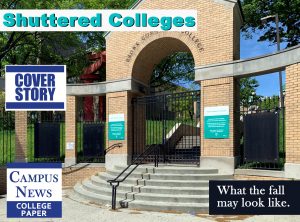By Matthew Khan
Campus News
As the spring 2020 semester winds down let us pause for a minute and really try to absorb the fact that we have all truly lived through an unprecedented time. The COVID-19 pandemic has affected everyone in some way, shape or form in ways which have never been seen in our lifetimes. What was probably the most striking was that these challenges presented themselves almost overnight. Usually change is a slow process and society acclimates at a manageable pace. This was certainly not the case with the pandemic.
Many of us were forced to deal with some type of loss over the course of the past few months while some of us dealt with many losses simultaneously. Loss can take many forms, some of which are more severe than others. Nonetheless, coping with losses are challenging if not equipped with the proper tools and skill set. The passing of a loved one, losing a pet, unemployment and the end of a relationship are some of the traumatic life occurrences that many will commonly identify as a loss. There is something which all of these unfortunate instances have in common. That common denominator is also present, quite subtly, in many other outwardly less traumatic life experiences.

Quite simply put, the commonality referenced above lies in the fact that humans can be affected adversely when life takes an unexpected turn and routines are broken. Let us look at two scenarios. For the first scenario, imagine that you were at a job for close to a decade. You have developed great rapport with your colleagues and they have become your second family. You decide to take a position at another firm due to the prospect of professional growth. In the second scenario everything remains the same except for the fact that your employment was terminated as a result of the pandemic. In both examples you will dearly miss your work family. The second scenario can lead to lingering negative internal feelings and distress. Campus shutdowns nationwide have redefined what it means to be a college student. The vast impact of the COVID-19 pandemic on all facets of society has forced us all to reevaluate where we stand as professionals, students, employees, parents, and overall as human beings.
While teaching Introduction to Business and Principles of Management, I hope to give my students skills which they can use long after they have received their grades. Life has taught me to try to make good with any situation no matter how good or bad. I hope to have shared that mantra with my students. Quite a few students wrote self-reflections addressing how the pandemic personally affected them while drawing parallels with material covered during lectures. Management students wrote, in detail, how the pandemic affects the seven challenges facing managers and the possible long term implications of those new challenges. A few other students are in the medical profession and offered our class a unique perspective on how the virus was being fought on the front lines. As the semester progressed, I eagerly awaited class time on Zoom as I believe we all found a new support system in one another. Whoever thought you would be able to find that in school?
Abraham Maslow, the American psychologist, showed that there are five levels of needs which can vary from time to time. He showed that these needs can serve as motivating factors. In moving forward, let us be motivated by a need to help others achieve a state of self-actualization. It is imperative that we take stock of what we have lost and what is truly important to us. We must adjust our belief systems and reform our identities. Attempting to make sense of life experiences and finding ways to ascribe meaning to these events are paramount. Only then can we redefine who we are. We, and our worlds, may now be different than a few months ago yet find comfort in the fact that the pandemic will eventually present an opportunity for all to rebuild.
 Matthew Khan is an Adjunct Professor in the Accounting and Business Administration Department at Nassau Community College.
Matthew Khan is an Adjunct Professor in the Accounting and Business Administration Department at Nassau Community College.







Facebook Comments